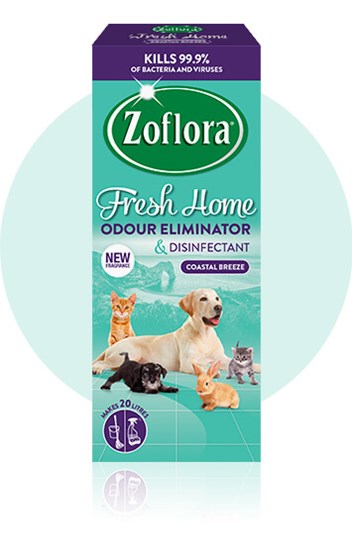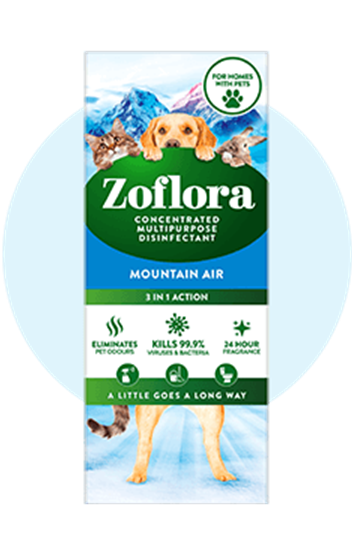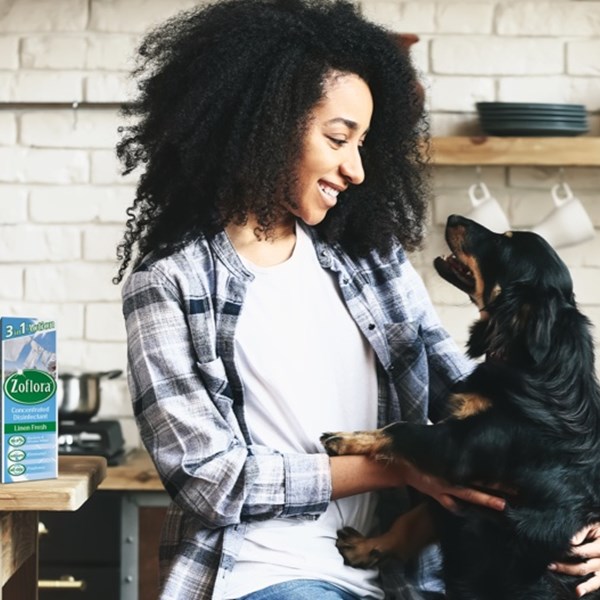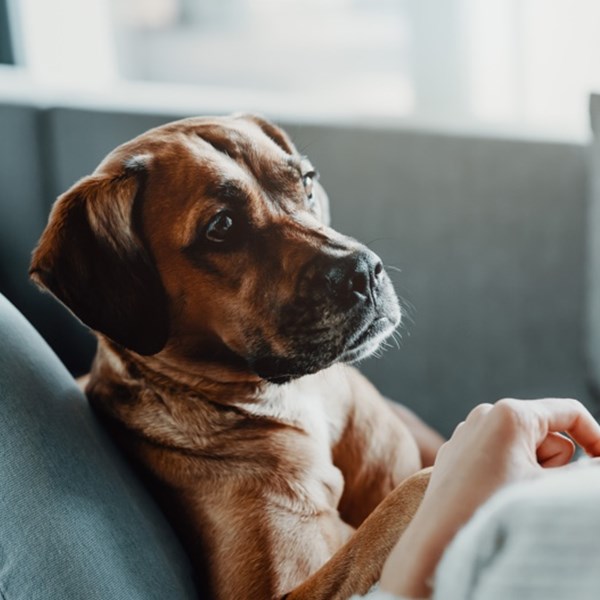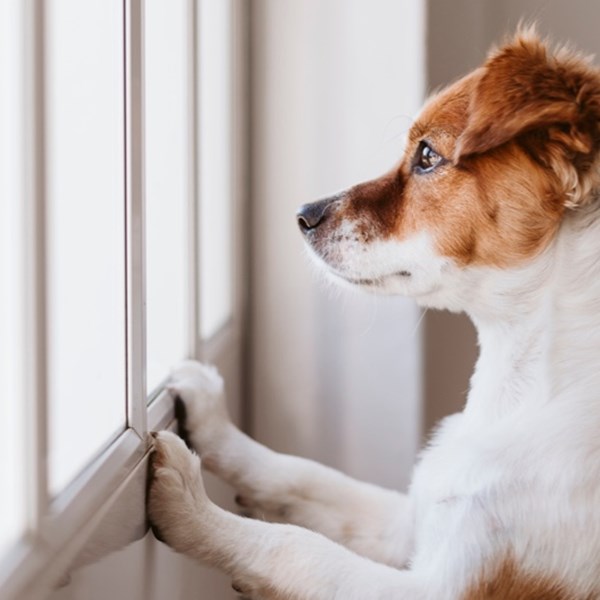How to Give Your Puppy the Best Start in Life
We are a nation of dog lovers, and always have been! There are 8.5 million dogs in the UK, and 800,000 families welcome a puppy into their home every year. And if you are one of them, congratulations! I hope you’re ready!
Get ready for some sleepless nights, some chewed up possessions and to get very familiar with your mop and bucket for those little accidents (made easier with Zoflora Fresh Home!).
Owning and raising a puppy is incredibly rewarding and fun, but it is also a big commitment and a lot of work!
Before Your Puppy Comes Home
It is important to be ready for your puppy when they arrive. It will be the biggest change in their life so far, and making the transition as smooth as possible will really help them settle in quickly.
Hopefully, your puppy will be coming from a responsible breeder who will give you information about what your pup has been eating, their worming and flea schedule so far, as well as what health checks and vaccines they have received. (Don’t worry if they haven’t had any injections by the time they arrive, this is totally fine and it can actually be easier to start the course with your own vet, rather than carrying one on started by the breeder).
If you aren’t able to get this information, this may raise concerns that your puppy is coming from a disreputable source and I would suggest you consider whether this is the right purchase. It is tough to walk away at this point, but poorly bred puppies have a much higher chance of both physical and mental health problems throughout their lives, not to mention the fact you could be supporting cruel breeding practices.
Your breeder is also legally required to microchip their puppies and register them in their name. You should be given your puppy’s microchip number and also information on how to change the ownership details to you.
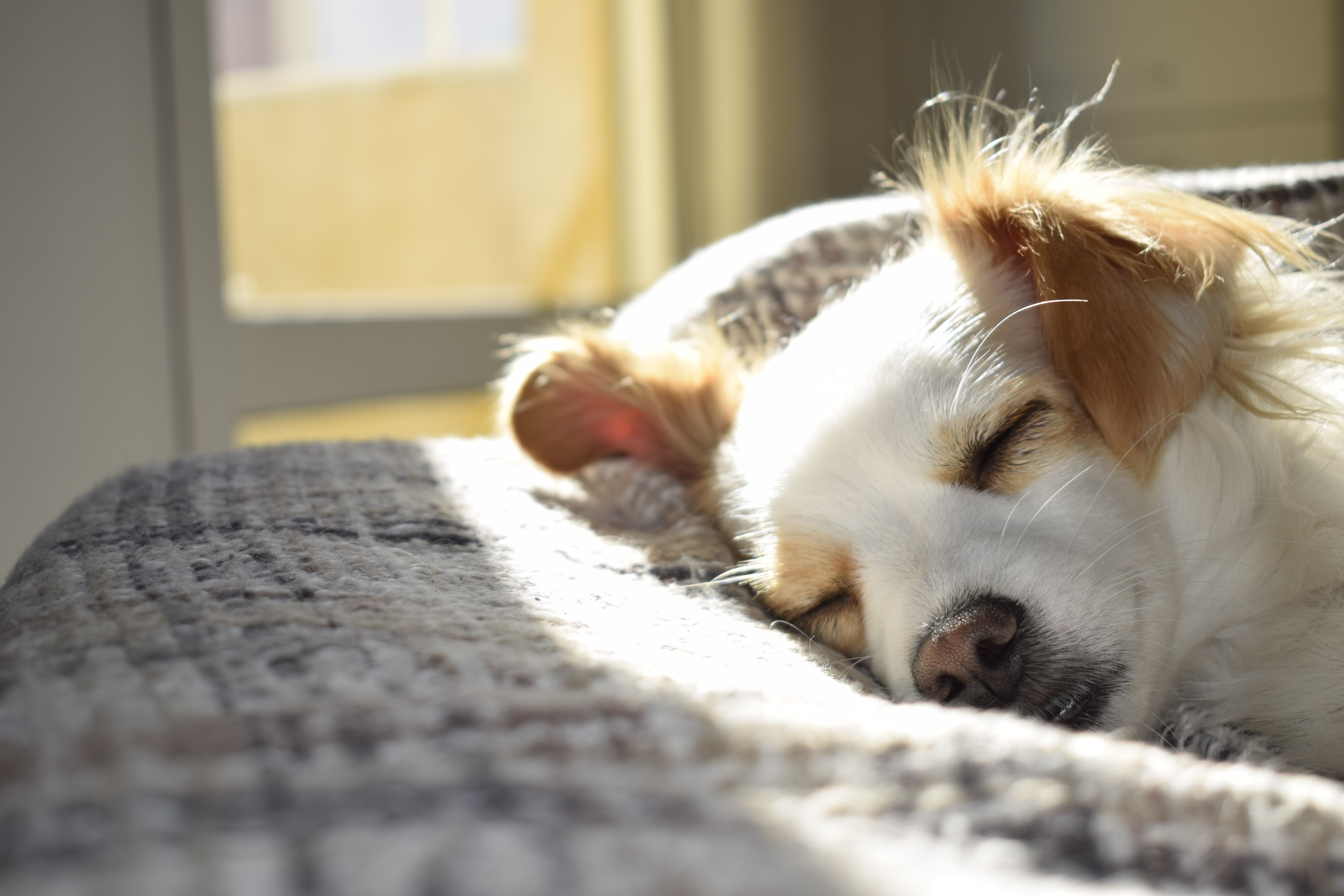
* If you feel you have to buy a puppy to ‘rescue’ it from a bad situation, please don’t! You are only supporting bad breeding. Walk away and contact the RSPCA and Trading Standards with your concerns.*
TOP TIP!
When you register your puppy’s microchip with your information, add as much detail as possible. Try to give several phone numbers, landlines and mobiles, and email addresses as well. If your pup ever goes missing, having lots of ways you can be contacted means the finders are more likely to be able to get hold of you, or a family member, quickly!
Time For Shopping!
First and foremost, you need somewhere lovely for your puppy to sleep! Just like human babies, they need lots of rest to ensure they are able to develop and grow properly.
Encouraging your pup to rest on their bed in their own space will also help them to learn to settle on their own and cope without you being right next to them. A vital lifeskill for all dogs is to be comfortable being left in their own company.
The perfect bed is large enough for your pup to stretch out to their full length so their growing joints are properly supported.
I would also advise you use a crate for the first few weeks or months while they are babies. Crates are great because they give your pup a clear place to rest, they feel more secure in small enclosed spaces (so throw a rug over the top), and although you should avoid shutting the door as much as possible (it is a bedroom, not a prison), you can close them in if you need to be sure they are safe and confined.
The ideal size is, again, big enough to fit a bed that allows them to stretch out and I would advise padding the sides so they can slump in style and comfort if they wish to.
You will also need to buy food bowls, water bowls, a collar or harness, a lead, food for when the breeder’s supply runs out, and don’t forget toys!

*Did you know puppies need to sleep between 18 and 20 hours a day! If they don’t, they can get cranky and will be less likely to listen to you.*
There is no need to go crazy and buy lots of toys, however much this is tempting!. My advice is to buy a small variety of different types. Ropes, balls, chews suitable for puppy mouths and simple puzzle toys are all good choices to start with. Once you get to know your pup, you will figure out which ones their favourites are, and then you can head out to the shops again! And don’t forget to stock up with Zoflora Fresh Home!
All puppies have accidents in the first few weeks or months and cleaning up properly is important. Zoflora’s Fresh Home fragrances are gentle on your pup’s sensitive sense of smell, while still being powerful enough to eliminate any unpleasant odours and kill 99.9% of viruses and bacteria.
Settling In
Your breeder should give you a blanket that they kept with the litter for a few days so your pup has a comforting scent with them when they arrive, as well as some of the food they have been weaned on to. You don’t have to continue with this diet if you don’t want to but keeping the food the same for a few days and then gradually transitioning to your choice will help to limit any diarrhoea or an upset tummy.
For the first week or so I would advise that you have your pup sleeping in their crate in your bedroom. This is the period when they are creating their bond with you and building the trust in your relationship. It is perfectly fine to keep them close during this time and reassure them that they are safe and protected if they wake up or get upset.
Once they are reliably sleeping through the night or once they are more confident in settling, you can gradually move the crate out of the bedroom and downstairs, if that is where you want them to be. They can stay with you if you like, but a 5kg puppy is very different to a 50kg adult dog!
If they do seem slightly distressed, try keeping the blanket from the breeder in their crate. Some pups also settle better with a hot water bottle to cuddle up to.
Sticking to the routine they had with the breeder is a good idea, as is being at home with your pup for the first week or so. If you have the luxury of being able to take some holiday, then do. Otherwise, arrange for family members to stay and ‘puppy-sit’ (you won’t struggle to find volunteers!).
Puppies and Children
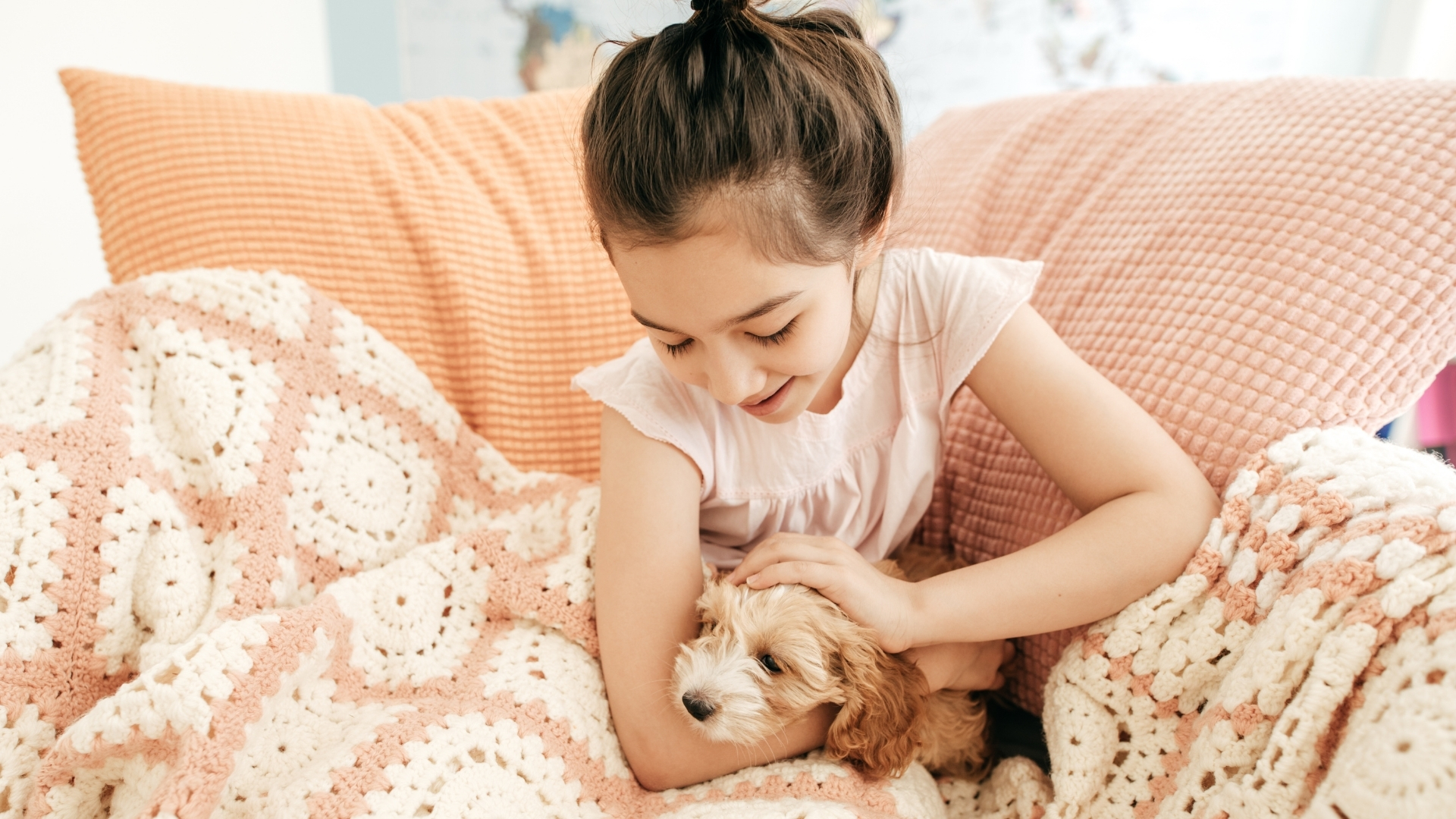
If you have children, they are going to be desperate to cuddle and play with their new family member! However, while it is important that they are involved in the puppy’s care and training, it is also vital that they don’t overwhelm them or stress them out, especially in the early days. Monitor their interactions carefully and explain to them that the puppy is not a toy. It is very easy for kids to become over-excited and wind the pup up to the point where they may start nipping or ragging at clothing.
This can frighten the child and cause a breakdown in their relationship. It is also very important that children know not to disturb the pup while they are sleeping or eating.
Helping our kids to have a positive, rewarding relationship with their dog is a wonderful learning experience and will give them a best friend for life. If your child is old enough, help them to find some simple training videos online that they can work on with their pet and take them along to any puppy classes you attend.
Training Your Puppy
Training your puppy can start right from the moment you get them home. Like children, pups love to learn and gain huge amounts of confidence and satisfaction from mastering new skills.
During lockdown, there are plenty of training videos and advice available online, but I would always recommend attending classes in person when possible or seeking out some qualified help once your pup is old enough. We don’t educate our children without professional help, so we shouldn’t with our puppies either! However, the area of dog training is unfortunately very poorly regulated and pretty much anyone can set themselves up and give lessons with no qualifications. I recommend visiting the Association of Pet Dog Trainers website, https://apdt.co.uk/, and finding your local registered person. The APDT have the most stringent membership requirements and ensure that their members are regularly assessed.
However, the one area of training you will probably need to master yourself is toilet training! Most pups will pick this up within a few weeks but during that time you will need to be prepared to clean up after them and have your Zoflora Fresh Home ready at all times!
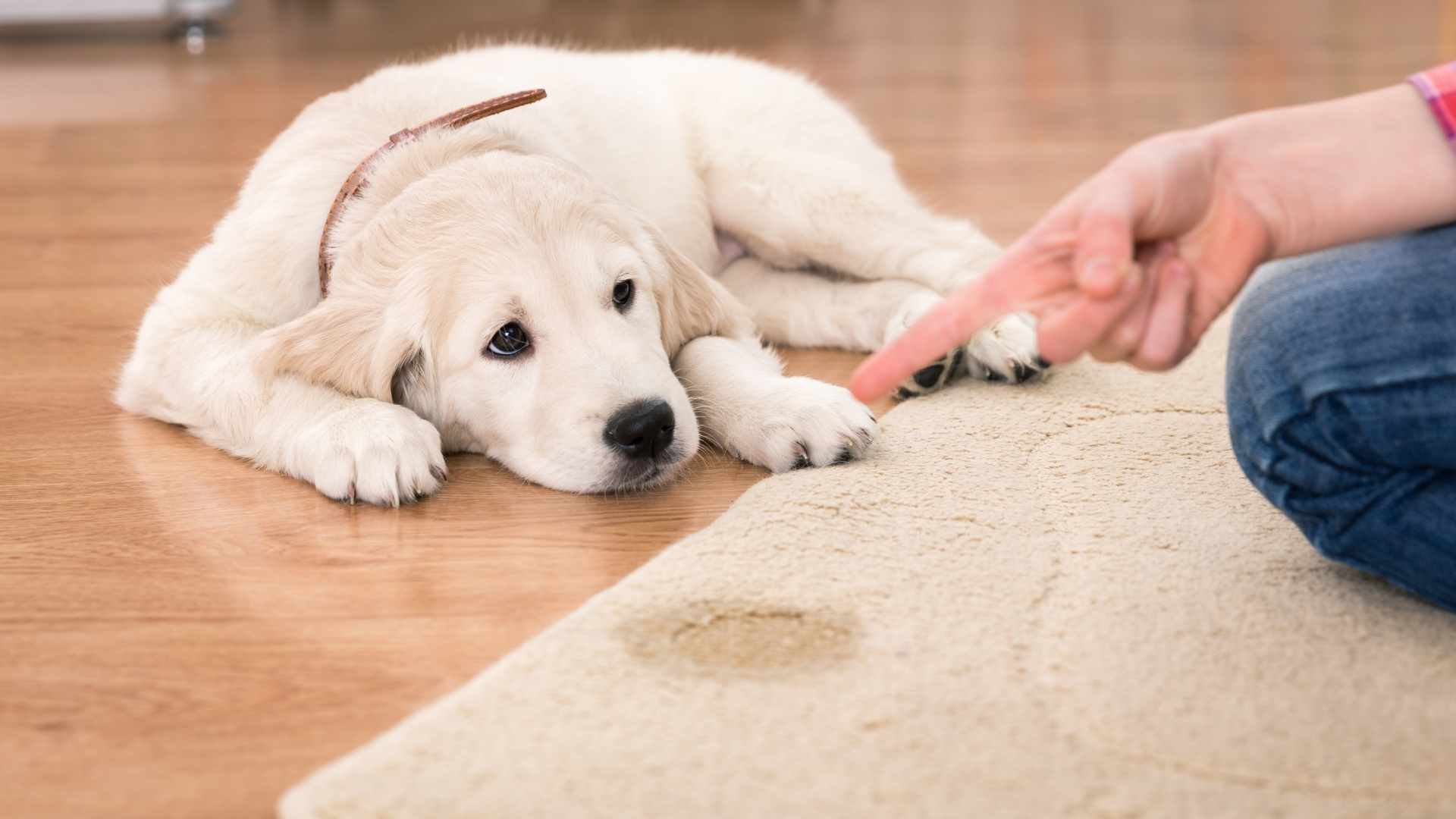
* A well-trained puppy will be a more secure and settled personality than one that’s never given any boundaries or education.*
Make sure that you take your pup outside every time they wake from a nap or have a meal. While you are in the garden, don’t distract them by playing games or interacting too much, just allow them to mooch about and sniff and hopefully, nature will take over! When it does give them lots of praise and, if you like, say a command word that they can start to associate with relieving themselves. This can make the process quicker and more reliable in the future.
If they have an accident in the house, it is really important to not tell them off. This will only confuse them and they will simply hide away for a quick pee, rather than doing it where you can see it!
The best way to deal with accidents is to ignore them completely and let them finish. Puppies thrive on attention and it doesn’t always matter if this is good or bad! To clean up any of these little accidents, you first need to remove your dog from the area. Next, dilute Zoflora 1 in 40 with water inside of a mop bucket, and simply mop over the area to leave it hygienically clean and beautifully fragrant. Do not allow the puppy back onto the treated area until the surface is fully dry.
Your Puppy’s Health
It is very important that you get in touch with your vet once your puppy has arrived and book an appointment for them. Unless you have any specific concerns I generally advise waiting for a few days, just to let them settle. Although most pups cope with the transition very well, it is a stressful time for them and adding to that stress with a vet visit and vaccination (although they only have a small impact) is generally better avoided.
This stress often manifests as diarrhoea. It is not unusual for puppies to have slightly runny poo in the first few days with you. For the vast majority, this resolves on its own, there is normally no need for medication or diet changes. My general rule is; as long as the puppy is happy, lively and eating and drinking well, don’t worry too much about their poo, as long as it normalises within 2-3 days.
A few days will also give you time to get to know your puppy and collect your thoughts about all the questions you will want to ask the staff at your practice! And don’t worry about asking too many. The more the better!
Vaccinations

The most important part of your pups health journey at this age is their vaccinations, which protect against potentially harmful diseases. They are Parvovirus, Distemper, Hepatitis, Parainfluenza and Leptospirosis. The first four are viral and Leptospirosis is a bacteria.
Puppies are given two injections 2-4 weeks apart to ensure they are fully protected. This is for two reasons:
The first is because of something called ‘Maternally Derived Antibodies’ or MDA. This is the protection that the mother passes from her immune system to her pups via the milk. It declines around the ages of 8-10 weeks and if it is still active in the pup’s system when they are jabbed, it will neutralise the vaccine before the pup’s own immune system gets a chance to. This is significant because of how vaccines work; a weakened form for a viral or bacterial disease is injected, the immune system fights it, wins and then retains that information so it can protect the body if it is ever exposed for real.
So, one reason we give two vaccines is to try to catch the pup when the MDA has waned and their own immune system has taken over. There are some dogs for whom this doesn’t work, but unless every patient is tested, we don’t know which. However, these are caught and protected when they receive their vaccine at a year old.
The second reason we vaccinate twice is because of the way vaccines work against bacterial infections. So the leptospirosis vaccine is always given twice when the course is started.
Your vet will also get your puppy on a regular treatment regime for fleas and worms, hopefully carrying on from the one the breeder had them on. If this wasn’t done, it isn’t too much of an issue provided you protect them moving forward.
Up to the age of 6 months, pups are given a worming treatment every month. Again, there are two reasons for this. The first is that pups are more likely to pick up worms than adult dogs; their curious natures mean they get into anything and everything! Worm eggs are microscopic and easily survive in the soil, so are often swallowed when your pup has an experimental chew on things they find in the garden and on walks. Also, a puppy’s immune system isn’t as strong as an adult dog, so if they are infected with worms, those worms can cause far more damage than they would if they were fully grown.
The other element that will have a massive impact on your pet’s health is their diet. Feeding a great quality puppy food will ensure they develop properly. This is particularly important for larger breed dogs who have a huge amount of growing to do.
My advice is to choose a complete, kibble food from a well known and reputable manufacturer. Your vet will be able to recommend some brands to you or arm you with the knowledge to pick one yourself if you wish. I do not advise feeding a raw diet to puppies, especially the bigger breeds, because there is too much variation in the quality and balance of the nutrients to be sure it won’t negatively impact their development.
Having a puppy join your life is an exhausting but exhilarating journey, but it gives you a family member and a best friend for many years to come, so ensuring that they have the very best start in life is vital!


